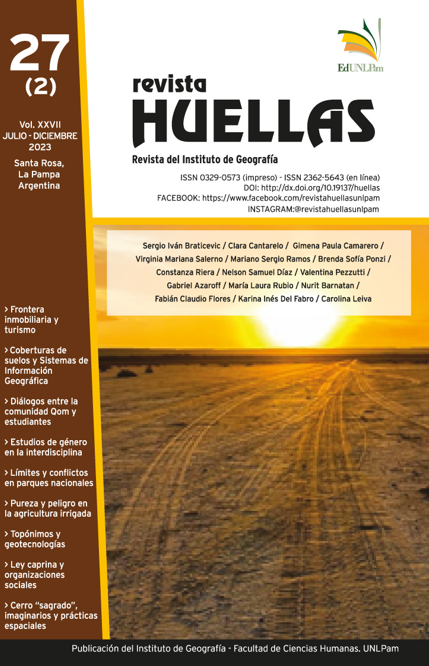Social processes in relation to the approval and implementation of Goat National Law Nº 26.141/2006: an anthropological approach from the Northeast of San Luis Province
DOI:
https://doi.org/10.19137/huellas-2023-2720Keywords:
organizational processes, public policies, rural development, participation, associativismAbstract
In 2006, the National Congress passed the Goat Law Nº 26.141, as part of a series of public policies that focused on the rural sector and, specifically, on family farming. The aim of this article is to analyze, from an anthropological perspective, the implementation of the Goat Law Nº 26.141, as a public policy, paying special attention to the diversity of actors and social relations involved in the process of its implementation in the Northeast of San Luis. Fragments of the ethnographic fieldwork carried out between 2019 and 2021 with the Unión de Productores/as Caprinos/as (Union of Goat Producers), an organization in northeastern San Luis, will be used for this study. First, the socio-productive strategies of the rural producers who are part of the organization will be studied. In the second section, the socio-historical context in which the Goat Law was enacted will be reviewed, taking into account the ways in which the agribusiness model was established in the country, and the characteristics adopted by rural development programs since the 1990s. Finally, the dynamics and modes of operation of the Goat Law will be studied in a situated manner.
Downloads
References
Alfaro, M. I. (1998). El problema del sostenimiento de las Organizaciones Campesinas: una estrategia de investigación posible. Publicaciones del Centro de Estudios de Sociología del Trabajo, (11), 1-21.
Aráoz, H. M., y Paz, F. (2016). Extractivismo: metabolismo necroeconómico del capital y fagocitosis de las agro-culturas. Reflexiones y aprendizajes desde las re-existencias campesinas en el Valle del Conlara. En: Porto-Gonçalves y Hocsman, D. (Comp.). Despojos y Resistencias en América Latina/Abya Yala, Estudios Sociológicos Editora, 2016. Libro digital.
Bourdieu, P. (2001). El capital social: apuntes provisionales. Zona abierta, (94), 83-87.
Bourdieu, P. (2013). La nobleza de Estado: educación de elite y espíritu de cuerpo. Beunos Aires: Editorial Siglo XXI.
Cáceres, D. M., Silvetti, F. M., Ferrer, G., Y Soto, G. (2006). “Y… vivimos de las cabras”: transformaciones sociales y tecnológicas de la capricultura. Buenos Aires: Editorial La Colmena.
Churin, N. (2016). La lucha por el territorio. Estrategias de reproducción social de las familias de la Asociación Campesinos del Valle (Provincia de San Luis, Argentina). Tesis de Maestría, Universidad Nacional de Rosario.
Feito, M. C. (1990) Trabajadores rurales en la horticultura bonaerense: el caso de los migrantes bolivianos. Tesis de Licenciatura, Facultad de Filosofía y Letras, Universidad de Buenos Aires.
Fernández, L. F. (2016). El Desarrollo Territorial Rural y su influencia en las políticas para la agricultura familiar. Cuestiones de Sociología, nº 15, Universidad Nacional de La Plata, Facultad de Humanidades y Ciencias de la Educación.
Foro Nacional De La Agricultura Familiar (FONAF) (2006). Nota de Presentación y Documento Elaborado por las Organizaciones Representativas del Sector Productor Agropecuario Familiar. 3, 4 y 5 de mayo de 2006. Mendoza, Argentina.
Geertz, C. (1987). La interpretación de las culturas, México: Ed. Gedisa.
Gómez, J. (2008) “Los límites del consenso – la propuesta de Desarrollo Territorial Rural en América Latina”. En: Fernandes, B.M. (org.), Campesinato e agronegócio na América Latina: a questão agrária atual. São Paulo: Expressão Popular. CLACSO livros.
Gras, C. y Hernández, V. (2009). El fenómeno sojero en perspectiva: dimensiones productivas, sociales y simbólicas de la globalización agro rural en la argentina. En La Argentina rural: de la agricultura familiar a los agronegocios (pp. 15-37). Buenos Aires: Editorial Biblos.
Guber, R. (2004). El salvaje metropolitano: reconstrucción del conocimiento social en el trabajo de campo. Buenos Aires: Paidós.
Gudynas, E. (2012). Estado compensador y nuevos extractivismos: Las ambivalencias del progresismo sudamericano. Nueva sociedad, (237), 128-146.
Lattuada, M. (2014). Políticas de desarrollo rural en la Argentina. Conceptos, contexto y transformaciones. Temas y debates, (27), 13-47.
Manzanal, M. (2017). Territorio, Poder y Sojización en el Cono Sur latinoamericano. El caso argentino. Mundo Agrario, 18(37), https://doi.org/10.24215/15155994e048.
Manzanal, M. y González, F. (2020). “Desarrollo y Desigualdad. Una perspectiva desde las políticas públicas de desarrollo regional y territorial en Argentina 1960-2016”. En Paz, Jorge y Cimadamore, Alberto (2020). Sustentabilidad, Pobreza y Desarrollo en el siglo XXI. México: Editorial Siglo XXI.
Nogueira, M. E., Urcola, M. A., y Lattuada, M. (2017). La gestión estatal del desarrollo rural y la agricultura familiar en Argentina: estilos de gestión y análisis de coyuntura 2004-2014 y 2015-2017. Revista Latinoamericana de Estudios Rurales, 2(4).
Oszlak, O. y O' Donnell, G. (1981). Estado y políticas estatales en América Latina: hacia una estrategia de investigación. Buenos Aires: Centro de Estudios de Estado y Sociedad (CEDES), Documento G.E. CLACSO/Nº4.
Quirós, J. (2021). ¿Para qué sirve unx antropólogx? La intervención antropológica y sus relaciones con la investigación. Universidad Nacional de Córdoba. Facultad de Filosofía y Humanidades.
Riera, C. (2016). Regar Cultivos Extensivos: La “Eficiencia” como “Cultura De Manejo”. En Córdoba, Argentina. Alternativa. Revista de Estudios Rurales, 3(6).
Rofman, A., García, A., García, L., Lampreabe, F., Rodríguez, E., Vázquez Blanco, J. (2008). Subordinación productiva en las economías regionales de la postconvertibilidad. Realidad Económica Nº 240 y 241.
Shore, C. (2010). La antropología y el estudio de la política pública: Reflexiones sobre la “formulación de las políticas. Antípoda. No. 10 pp. 21-49.
Fuentes
Ley Nacional Nº 26.141/2006. Régimen para la Recuperación, Fomento Y Desarrollo De La Actividad Caprina.
Decreto del Poder Ejecutivo Nacional Nº 1502/2007. Régimen para la Recuperación, Fomento Y Desarrollo De La Actividad Caprina.
Resolución Nº 376/2008. Régimen para la Recuperación, Fomento Y Desarrollo De La Actividad Caprina. Créase el "Manual Operativo" de la Ley Nº 26.141 para la Recuperación, Fomento y Desarrollo de la Actividad Caprina. Secretaría de Agricultura, Ganadería, Pesca y Alimentos.
Resolución 1053/2012. Régimen para la Recuperación, Fomento Y Desarrollo De La Actividad Caprina. Apruébese Manual Operativo. Ministerio de Agricultura, Ganadería y Pesca.
Resolución 251-E/2017. Apruébese el Manual Operativo del Régimen para la Recuperación, Fomento Y Desarrollo De La Actividad Caprina. Ministerio de Agroindustria.










.png)












3.jpg)


